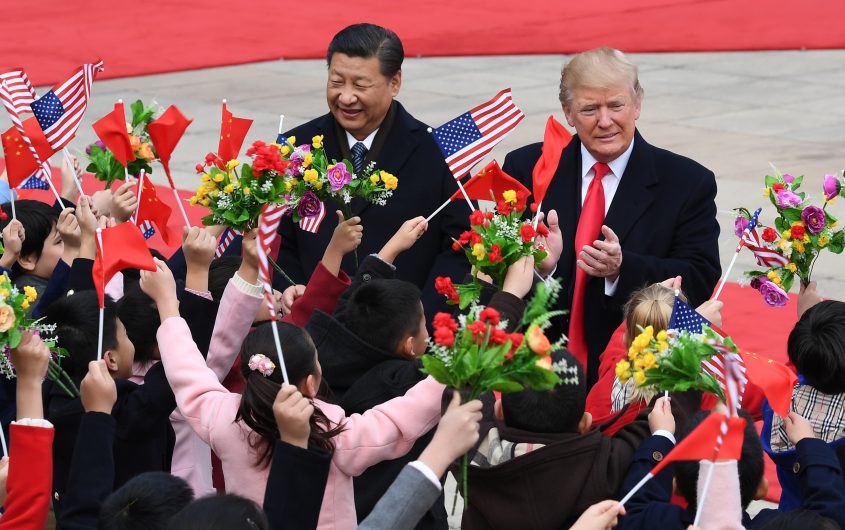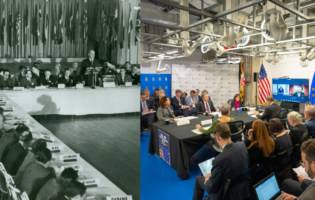
Xinhua/Rao Aimin via Getty Images
Name the Free-Market Economy – America or Europe?

Peter S. Rashish
Vice President; Director, Geoeconomics Program
Peter S. Rashish, who counts over 25 years of experience counseling corporations, think tanks, foundations, and international organizations on transatlantic trade and economic strategy, is Vice President and Director of the Geoeconomics Program at AICGS. He also writes The Wider Atlantic blog.
Mr. Rashish has served as Vice President for Europe and Eurasia at the U.S. Chamber of Commerce, where he spearheaded the Chamber’s advocacy ahead of the launch of the Transatlantic Trade and Investment Partnership. Previously, Mr. Rashish was a Senior Advisor for Europe at McLarty Associates, and has held positions as Executive Vice President of the European Institute, on the Paris-based staff of the International Energy Agency, and as a consultant to the World Bank, the German Marshall Fund of the United States, the Atlantic Council, the Bertelsmann Foundation, and the United Nations Conference on Trade and Development.
Mr. Rashish has testified on the euro zone and U.S.-European economic relations before the House Financial Services Subcommittee on International Monetary Policy and Trade and the House Foreign Affairs Subcommittee on Europe and Eurasia and has advised three U.S. presidential campaigns. He is a member of the Board of Directors of the Jean Monnet Institute in Paris and a Senior Advisor to the European Policy Centre in Brussels. His commentaries have been published in The New York Times, the Financial Times, The Wall Street Journal, Foreign Policy, and The National Interest, and he has appeared on PBS, CNBC, CNN, and NPR.
He earned a BA from Harvard College and an M.Phil. in international relations from Oxford University. He speaks French, German, Italian, and Spanish.
__
A Martian is being briefed about his upcoming visit to Earth, where he is told there are two big economies, Reagania and Bureaucratia. Reagania is known for its belief in individualism and free markets while Bureaucratia likes the welfare state and regulated markets. Bureaucratia sees Reagania as brutal, the Martian is told, while Reagania views Bureacratia as coddled. As the Martian’s UFO is about to take off, his chief aide rushes to provide an update for his briefing book. “What’s this about?” asks the Martian. His assistant replies, “moments ago one of the two economies you are visiting arranged with a third one to import $200 billion more of its products.” A quick study, the Martian naturally starts to slip the new page into his Bureacratia file, murmuring to himself “typical of them, trying to manage trade!” Spotting the mistake, his aide quickly interjects, “no sir, Reagania did this” and moves the document to the right place. Our Martian, buckling his seat belt, looks puzzled…
***
The announcement that the U.S. administration may be willing to exchange a commitment by China to purchase up to $200 billion in U.S. goods in return for the White House suspending the tariffs it threatens to impose via its section 301 case against Beijing’s intellectual property and technology transfer violations reveals the dead-end into which U.S. trade policy may be heading.
The president believes that bilateral deficits are a sign of “losing,” and that eliminating them should be a paramount goal of U.S. trade policy. China’s huge new imports from the U.S., if they materialize, are intended to do just that—bring U.S.-China trade closer to balance.
In that case, the discredited doctrine of managed trade—where governments organize between them how much their countries import and export—should be this administration’s new mantra.
Now, as far as China is concerned, this approach does have at least some chance to be successful. Thanks to its state-capitalist economy, the authorities in Beijing can instruct a number of businesses to step up their purchases from the United States.
While buying more U.S. products would do nothing to change China’s unfair trading practices that are at the core of the 301 case, it would allow the White House to declare victory in the contest it seems to have decided matters most. The $375 billion U.S. trade deficit with China would be more than cut in half.
This kind of outcome would be impossible in the other major trade case the administration is pursuing, where Europe has become the focus. The section 232 action aims to restrict U.S. imports of steel and aluminum out of a concern for national security, the idea being that these metals are needed for defense and should be produced at home rather than purchased abroad (even from U.S. allies).
If China were to confirm that it plans to import $200 billion more from the U.S., it would not be hard to imagine the White House trying to repeat this “victory” in its approach to the EU. In exchange for the U.S. holding back on its announced tariffs on steel and aluminum, the EU would agree to import tens of billions of dollars of additional U.S. goods.
The problem for the U.S. administration is that unlike China, the European Union consists of 28 market economies where, as in the U.S., private companies take no direction from the state. This is true even if Germans like to call their model a “social market economy” because it includes a strong social safety net.
While China could in principle agree to participate in a U.S. campaign of managed trade, the EU could not.
What the EU could do instead is work with the U.S. to reinforce the primacy of the market economy worldwide. As a partner…and as a role model?








